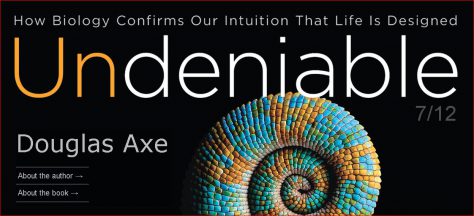
It’s not out yet, but the Kindle edition is only $12.99, so I pre-ordered it. That helps to get the book up in the bestseller lists. I’ll add it to my list of books that I am reading for the third quarter later, and maybe feature it in the coveted spot in the right column of the blog.
Anyway, here is the description:
Throughout his distinguished and unconventional career, engineer-turned-molecular-biologist Douglas Axe has been asking the questions that much of the scientific community would rather silence. Now, he presents his conclusions in this brave and pioneering book. Axe argues that the key to understanding our origin is the “design intuition”—the innate belief held by all humans that tasks we would need knowledge to accomplish can only be accomplished by someone who has that knowledge. For the ingenious task of inventing life, this knower can only be God.
Starting with the hallowed halls of academic science, Axe dismantles the widespread belief that Darwin’s theory of evolution is indisputably true, showing instead that a gaping hole has been at its center from the beginning. He then explains in plain English the science that proves our design intuition scientifically valid. Lastly, he uses everyday experience to empower ordinary people to defend their design intuition, giving them the confidence and courage to explain why it has to be true and the vision to imagine what biology will become when people stand up for this truth.
Armed with that confidence, readers will affirm what once seemed obvious to all of us—that living creatures, from single-celled cyanobacteria to orca whales and human beings, are brilliantly conceived, utterly beyond the reach of accident.
Our intuition was right all along.
Trailer is here:
Evolution News has a deal for those who pre-order:
A remarkable thing about evolutionary theory is the way it demands that we deny our intuition at almost every step. Evolutionists then assure us that the science is all figured out, so we needn’t trouble our silly heads about the relevant biology.
In a new book, Douglas Axe of Biologic Institute turns this standard assurance on its head. In Undeniable: How Biology Confirms Our Intuition That Life Is Designed, Dr. Axe restores the place of intuition alongside intellect in considering the question of life’s origins.
Undeniable will be published on July 12 by HarperOne, but you can pre-order before then and participate in an exclusive, private conference call with Dr. Axe and talk- show host Michael Medved. You’ll also receive digital versions of three complete books from Discovery Institute Press: Debating Darwin’s Doubt, The Unofficial Guide to Cosmos, and Science & Human Origins. See here for easy instructions.
And now, I have a secret story to tell you. I met Doug Axe face to face way back in the late 1990s. He told me and some other people about the post-doctoral work he was doing at Cambridge University on the probabilities of getting a functional protein by chance. He made me promise not to tell anyone, and I never did. It was from conversations like that with the intelligent design scholars that I decided to start using an alias.
From his research at Cambrudge, Dr. Axe found that the number of functional amino acid sequences is tiny:
Doug Axe’s research likewise studies genes that it turns out show great evidence of design. Axe studied the sensitivities of protein function to mutations. In these “mutational sensitivity” tests, Dr. Axe mutated certain amino acids in various proteins, or studied the differences between similar proteins, to see how mutations or changes affected their ability to function properly. He found that protein function was highly sensitive to mutation, and that proteins are not very tolerant to changes in their amino acid sequences. In other words, when you mutate, tweak, or change these proteins slightly, they stopped working. In one of his papers, he thus concludes that “functional folds require highly extraordinary sequences,” and that functional protein folds “may be as low as 1 in 10^77.”
The problem of forming DNA by sequencing nucleotides faces similar difficulties. And remember, mutation and selection cannot explain the origin of the first sequence, because mutation and selection require replication, which does not exist until that first living cell is already in place.
He published his findings in four separate publications with the prestigious Journal of Molecular Biology, and got his PhD with it. To get a PhD from Caltech, and then do post-doctoral work at Cambridge, you have to be good. And Dr. Axe is very, very good.
I have used the papers he wrote in many, many conversations with engineers in different companies where I have worked. He hit a home run with that research. You could never look at the evidence for intelligent design the same way again. Christian parents, if you have any children, be sure that you tell them about Doug Axe’s story.


